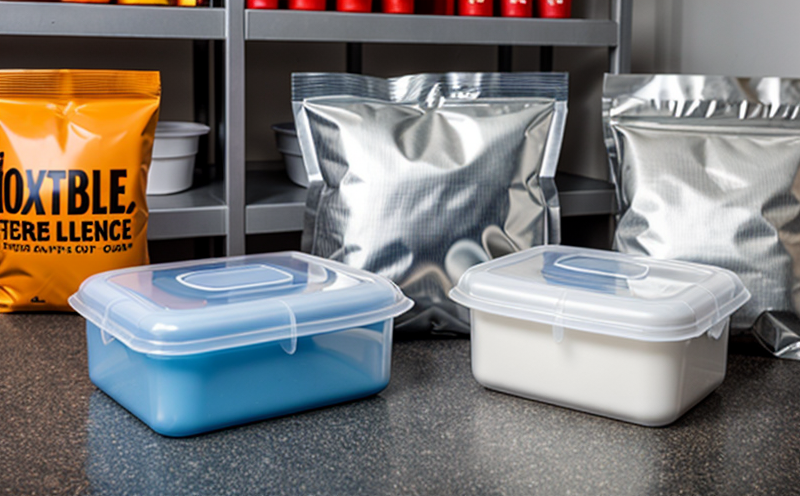ASTM D1709-16 Impact Resistance of Plastic Films
The ASTM D1709 standard test method evaluates the impact resistance properties of plastic films. This is a critical property for flexible packaging as it ensures that the film can withstand potential impacts without compromising its structural integrity. The test measures how well the material resists sudden, localized forces applied to its surface.
The ASTM D1709-16 procedure involves dropping a specified mass from a height onto the specimen. The impact force is measured and recorded, providing insight into the film's ability to absorb shock without tearing or fracturing. This test is particularly important for packaging that must protect products during shipping and handling.
The test setup includes an impact tester equipped with a drop hammer. The specimen is cut to standard dimensions specified in ASTM D1709, typically 254 mm by 254 mm (10 inches by 10 inches). A known mass is dropped from a predetermined height onto the center of the film. The test is conducted at room temperature unless otherwise specified.
The impact resistance properties measured in this test are crucial for ensuring that packaging materials can protect products during transportation and handling. For instance, in the food industry, where packages must safeguard perishable goods from damage, ASTM D1709-16 provides critical data to ensure product safety and quality.
The results of this test help quality managers and compliance officers make informed decisions about material selection and formulation adjustments. R&D engineers can use these data points to innovate and improve the performance of their packaging materials. For procurement teams, understanding ASTM D1709-16 ensures they are selecting suppliers who meet stringent impact resistance standards.
| Parameter | Description |
|---|---|
| Mass of Drop Hammer | 50 grams (1.76 ounces) |
| Height from Which Hammer Drops | 2 meters (6.56 feet) |
| Test Specimen Dimensions | 254 mm by 254 mm (10 inches by 10 inches) |
| Test Temperature | 23°C ± 2°C (73.4°F ± 3.6°F) |
The test results are typically reported as the maximum force applied during impact, measured in Newtons or Pounds-force. These values help compare different materials and assess their suitability for various applications.
In summary, ASTM D1709-16 is a vital tool in ensuring that flexible packaging films meet stringent impact resistance requirements. By using this standard test method, manufacturers can verify the durability of their products and ensure compliance with industry standards.
Why It Matters
The importance of ASTM D1709-16 cannot be overstated in the context of flexible packaging testing. Impact resistance is a critical property that ensures the integrity and protection of packaged goods during transportation and handling.
In industries such as food, pharmaceuticals, and electronics, the ability to withstand impact without compromising product quality is paramount. Flexible packaging films are often subjected to rough handling, jostling in transit, or even accidental impacts from consumers. ASTM D1709-16 helps manufacturers assess how well their materials can handle these stresses.
The test results provide valuable insights into the durability of the packaging film. This information is essential for quality managers and compliance officers who must ensure that products meet regulatory requirements. For R&D engineers, this data supports ongoing product development to enhance performance and reliability. Procurement teams use ASTM D1709-16 as a benchmark when selecting suppliers and materials.
The test results also aid in identifying potential weaknesses in the packaging design or material composition. By understanding how different films perform under impact, manufacturers can make informed decisions about material selection and formulation adjustments. This ensures that the final product not only meets but exceeds customer expectations for protection and quality.
Applied Standards
| Standard Number | Description |
|---|---|
| ASTM D1709-16 | Test Method for Impact Resistance of Plastic Films |
| ISO 2787 | Plastics—Determination of Charpy impact strength by pendulum test on small specimens |
| EN ISO 14639-1 | Flexible packaging for foodstuffs—Part 1: Requirements and test methods |
The ASTM D1709 standard is widely recognized in the industry as a definitive method for evaluating impact resistance. It complements other standards such as ISO 2787, which focuses on Charpy impact strength testing, and EN ISO 14639-1, which sets requirements for flexible packaging used in foodstuffs.
These standards provide a comprehensive framework for ensuring that the packaging meets the necessary safety and quality standards. By adhering to these guidelines, manufacturers can ensure their products are reliable and safe for end-users.
Customer Impact and Satisfaction
The impact of ASTM D1709-16 on customer satisfaction cannot be understated. By ensuring that flexible packaging films meet stringent impact resistance requirements, manufacturers can provide products that are durable and reliable. This enhances the overall quality and safety of packaged goods.
Customers who rely on these products for protection during transportation or handling appreciate the peace of mind that comes with knowing their purchases are well-protected. For instance, in the food industry, where perishable items need to be safeguarded from damage, ASTM D1709-16 ensures that packaging materials can withstand rough handling without compromising product integrity.
The test results also play a crucial role in maintaining compliance with regulatory requirements. This helps manufacturers avoid potential legal issues and enhances their reputation for quality and reliability. Satisfied customers are more likely to recommend the products, leading to increased customer loyalty and market share.





